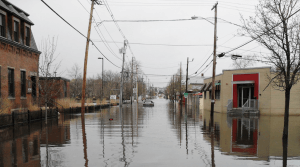Essential Learning Series: Building Community and Climate Resilience
 In 2019, River Network and the Urban Waters Learning Network (UWLN) focused on providing support to urban waters practitioners to help them build community and climate resilience through education, mitigation, and planning. We addressed this topic through the three-part webinar series below, blog posts, Impact Stories, and other resources.
In 2019, River Network and the Urban Waters Learning Network (UWLN) focused on providing support to urban waters practitioners to help them build community and climate resilience through education, mitigation, and planning. We addressed this topic through the three-part webinar series below, blog posts, Impact Stories, and other resources.
Check out the webinar series and additional resources below for a comprehensive dive on this important topic.
Building Community Resilience: Climate Change Education as a First Step
The effects of climate change on urban areas—like flooding, heat, and drought—are clear to urban waters practitioners around the nation. However, the science of a changing climate can be complex and unclear to the communities that are affected. This webinar includes organizations that are communicating climate change science to the public via different forms of education.
Jennifer Sloan shares a primer on relevant climate change topics related to urban waters, followed by examples of Groundwork Hudson Valley’s climate change curriculum and other online materials available for educators and program managers. We also hear from two organizations that are incorporating climate change education into different kinds of programming to drive community action. Juliana Gonzales shares how the Watershed Project includes climate change education in different kinds of programming, from school-based programs (like Resilient by Design) to city planning (like regional master planning). Alicia Lehrer shares the results of a recent climate survey that the Woonasquatucket River Watershed Association conducted with residents from an area prone to flooding. Learn about how the survey was constructed and implemented as well as how the survey results help to guide future educational opportunities and advocacy actions for the community.
> Watch here or download as PDF.
Additional Resources
Centering the Community in Resilience Planning
Community members who are most vulnerable to climate impacts are in the best position to make decisions about how to be better prepared – this webinar provides a framework for raising community voices and provides examples of resiliency plans that benefit the most vulnerable areas in our cities. Expert speakers include:
Corrine Van Hook-Turner from Movement Strategy—who discusses the importance of community-based resilience planning and provides some insights on how to do it, drawing on her own experiences as well as highlighting local examples included in the National Association of Climate Resilience Planners guidebook, Community-Based Climate Resilience Planning: A Framework.
Drew Curtis from the Ironbound Community Corporation shares his experience in the South Ironbound community, a neighborhood of Newark, NJ. The South Ironbound community—already heavily impacted by industry, poor air and water quality, and stormwater flooding—was severely affected by Hurricane Sandy. In 2015, the Ironbound Community Corporation, in cooperation with the American Planning Association New Jersey Chapter Community Planning Assistance Program and community members, developed and implemented the South Ironbound Resiliency Action Plan.
> Watch here or download as PDF.
Additional Resources
- Community-Driven Climate Resilience Planning: A Framework from National Association of Climate Resilience Planners
- The People’s Plan (Marin City)
- Guide to Equitable Community-Driven Climate Preparedness Planning from Urban Sustainability Directors Network
- Our Communities, Our Power: Advancing Resistance and Resilience in Climate Change Adaptation from NAACP Environmental and Climate Justice Program
After the Storm: Equitable Recovery and Resilient Adaptation
How do you build resilience after disaster strikes, knowing that the area is prone to the continued effects of climate change and subject to displacement pressures? What are the barriers to rebuilding and what are some successful ways to adapt? The third webinar in this Urban Waters Learning Network series on climate and community resilience aims to answer these questions. This session focuses on two organizations that work to build resilience as part of recovery and adaptation, while also facing displacement pressures and inequities.
In the webinar, we hear from Arthur Johnson, Executive Director for the the Lower 9th Ward Center for Sustainable Engagement and Development (CSED) in New Orleans and Yvette Chen, Planning and Policy Analyst from the Fair Share Housing Center (FSHC) in New Jersey. Johnson shares how, fourteen years after Katrina, building resilience looks different today than it did early on. Beyond immediate recovery, CSED works to adapt to the effects of climate change through coastal rehabilitation, greening the built environment, increasing food security, and rebuilding homes to be energy efficient, safe, and sustainable. Chen shares housing studies and data that examines post-disaster investments that help FHSC to work on their main goal of ensuring that recovery is both equitable and resilient by prioritizing low-income renters and homeowners.
> Watch here or download as PDF.
Additional Resources
- How to Prepare for Natural Disasters: A Pre-Disaster Toolkit for Small- to Medium-Size Communities from Urban Waters Federal Partnership
- “How Federal Disaster Money Favors the Rich” from NPR
- “Settlement Reached in Sandy Civil Rights Case” from Fair Share Housing Center
- OpenFEMA Individual Assistance Open Disaster Statistics and Large Disasters Data Sets from FEMA




